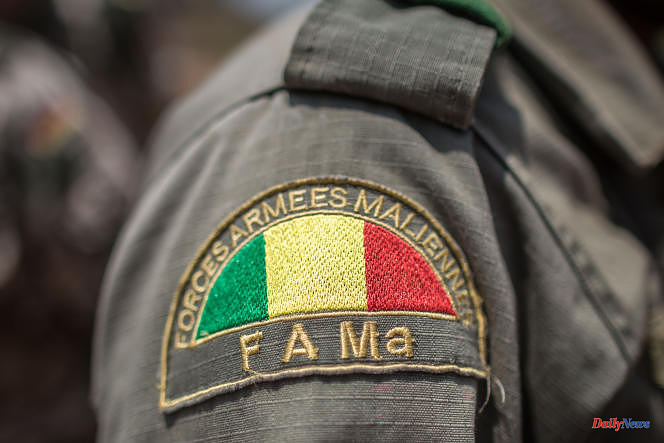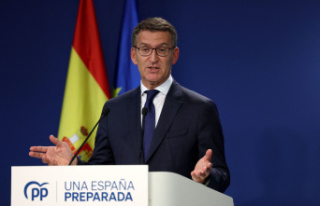The alleged perpetrators of the worst massacre perpetrated in Mali since the start of the war against jihadism in 2012 have been identified and sanctioned by Washington. In a statement released Thursday, May 25, the US State Department imposed visa restrictions on two Malian soldiers, Colonel Moustapha Sangaré and Major Lassine Togola, designated as "responsible for elements of the Malian armed forces (FAMA) who carried out the operation in Moura". In March 2022, at least 500 people were killed in this village in the center of the country during an operation carried out by the FAMA and members of the Russian private paramilitary group Wagner.
In parallel with the sanctions imposed on these two Malian officers, the American Treasury also blocked and seized all the assets held in the United States by Ivan Aleksandrovich Maslov, designated as the boss of the private Russian paramilitary group Wagner in Mali. According to the treasury, this Russian has "worked in close coordination with Malian government officials to execute the deployment of the Wagner Group in Mali", starting in late 2021.
Colonel Moustapha Sangaré is presented by Washington as the commander of the 33rd Parachute Commando Regiment (33rd RPC), an elite unit created in 1961, the day after the country's independence, and whose members are known to Malians as "red berets", in reference to the color of their headgear. According to the Malian army, Colonel Sangaré arrived at the head of the 33rd RPC in September 2019.
At the heart of the second putsch
"He's a longtime 'red beret'. He was involved in the April 2012 counter-coup,” slips a security source who met him several years ago in Mali. On this date, the 33rd RPC was trying, in vain, to regain control of the "green berets" led by Captain Amadou Sanogo, at the time of the putsch which overthrew the elected president Amadou Toumani Touré, known as "ATT", in March 2012, in a context of the start of war, started two months earlier in the north by a coalition of former separatist and jihadist rebel groups.
Eleven years later, Mali remains plagued by both security and political instability: the military regained power from civilians after two coups in August 2020 and May 2021. The 33rd RPC, for its part, seems largely committed to the because of the junta led by Colonel Assimi Goïta.
Major Lassine Togola, also sanctioned, is designated by the US administration as the acting commander of the Autonomous Special Forces Battalion (BAFS), a unit created in June 2018 and responsible in particular for coordinating and conducting the most sensitive operations. of the Malian army, while participating in the protection of the authorities.
Like the 33rd RPC, the BAFS is a unit close to the ruling junta. It was even commanded, from July 2018, by the current president of the transition, Colonel Assimi Goïta, who already led the operational unit between 2016 and 2017, according to the Malian presidency. After participating in the first coup in August 2020, the men of the BAFS were at the heart of the second putsch which finally allowed their leader to rise to the top of the state in May 2021.
Illustration of the importance of this unit within the junta's security system, the BAFS was the gateway for Wagner's mercenaries to the center of the country. Deployed in Mali to help Bamako fight terrorism, the Russian private security group, which now has nearly 1,600 men on the ground, gained a foothold in the center of the country in early 2022, settling in the military camp of the BAFS in Sofara, according to several local and international security sources.
"Disinformation campaign"
It is from this locality that Wagner and the FAMA conduct a large part of their anti-terrorist operations in the center and during which several cases of abuses against civilians have been noted by humanitarian and human rights organizations. Moura, the battered village, is located just 15 km from the Sofara BAFS base.
The special forces of this battalion, whose acting chief has just been sanctioned by Washington, had received training from the United States in February 2020, as part of the "Flintlock" military exercise, which the United States Africa Command organizes meetings each year with its main security partners on the continent in order to strengthen their operational capacities. A training from which the Malian president, Assimi Goïta, had also benefited a year earlier.
This collaboration has not prevented relations between Washington and Bamako from deteriorating since the August 2020 coup. However, they have not resulted in a divorce either, as was the case in 2022 between the France and Mali. After expelling the French ambassador Joel Meyer from the country, the Malian authorities initially pushed the soldiers of the French operation "Barkhane" out.
In a statement released on Saturday, May 27, they reacted by calling on the United States to stop the "disinformation campaign against Mali", deeming the accusations and sanctions imposed by the American administration "baseless and unjust". "The message that the United States government conveys as well as the public form of its announcement undermines the presumption of innocence of those concerned and discredits the entire military institution", lambasted Colonel Abdoulaye Maïga , government spokesman, calling Colonel Sangaré and Major Togola "valiant officers of the Malian army".
"Fictional Story"
In mid-May, the junta protested against the conclusions of the report on the Moura massacre published by the Office of the United Nations High Commissioner for Human Rights. In this 41-page document consulted by Le Monde and which Bamako considers "biased" and "based on a fictitious narrative", the UN had accused Malian soldiers and "foreign military personnel" of being responsible for the massacre.
A version disputed by the Malian government, which maintains that only "terrorist fighters" were killed by the army in Moura and which persists, moreover, in denying the presence of Wagner in the country, despite confirmations of the deployment of the group in Mali emanating from the Russian authorities.
In its May 27 statement, the junta also denied accusations made by Washington five days earlier that Wagner tried to pass through Mali to buy weapons to support the Russian war effort in Ukraine. "In response to this accusation from the State Department," notes Colonel Maïga, Rachna Korhonen, the United States Ambassador stationed in Bamako, was "invited" to the Malian Foreign Ministry on May 25, "to signify to him, among other things, the extreme seriousness of the false accusations brought against the Republic of Mali".












